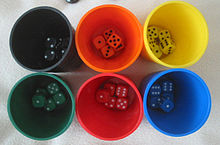



 A Perudo set
A Perudo setDudo (Spanish for I doubt), also known as Cacho, Pico, Perudo, Cachito or Dadinho is popular dice game played in Peru, Colombia, Chile, Bolivia, Argentina, Brazil and other Latin American countries. It is a more specific version of a family of games collectively called Liar's Dice, which has many forms and variants. This game can be played by two or more players and consists of guessing how many dice, placed under cups, there are on the table showing a certain number. The player who loses a round loses one of their dice. The last player to still retain a die (or dice) is the winner.
Each player starts having five dice and a cup, which is used for shaking the dice and concealing your dice from the other players. Players roll die in order, to determine where and in what order they sit. Highest first, then next lowest and so on. In the event of a tie between 2 players, they simply re-roll until one gains a higher score. After deciding who starts the game (this can be done by making each player roll one die, for example), the players shake their dice in their cups, and then each player looks at his or her own dice, but keeps these dice concealed from the other players. Then, the first player says how many dice are showing - at a minimum - a certain number (for example, "five threes", meaning there are at least 5 dice showing a three, which can be fact or fictional) and tells the next player (play always moves clockwise) to raise, call or spot on the announcement.
In Dudo, the aces (dice showing one) are wild. When checking the dice, aces are counted as the dice that were announced.
When a player that had two dice loses one, an "obliging", also known as palafico, round is made. This player will always start the round because of losing a die.
The rules in these rounds are different.